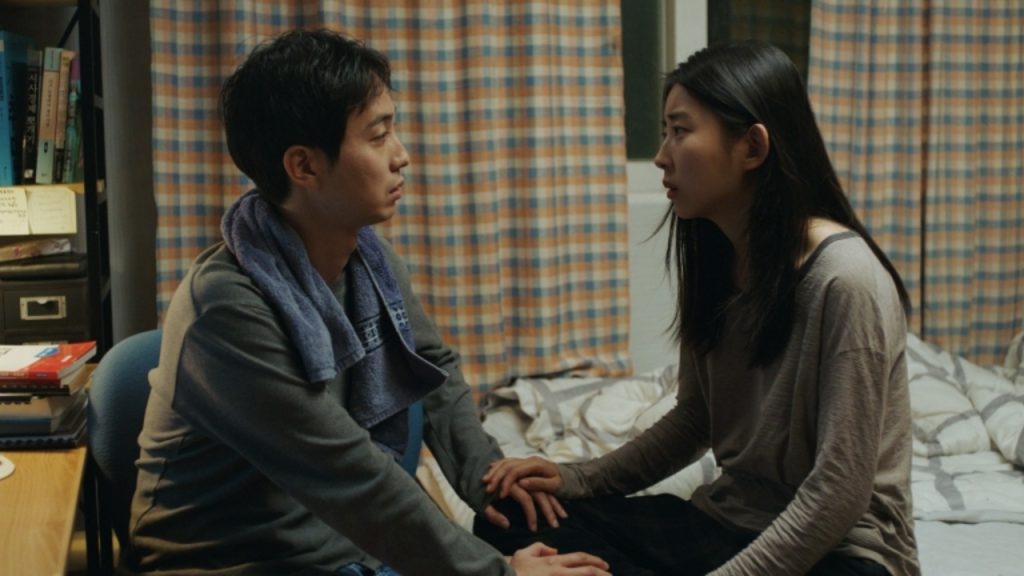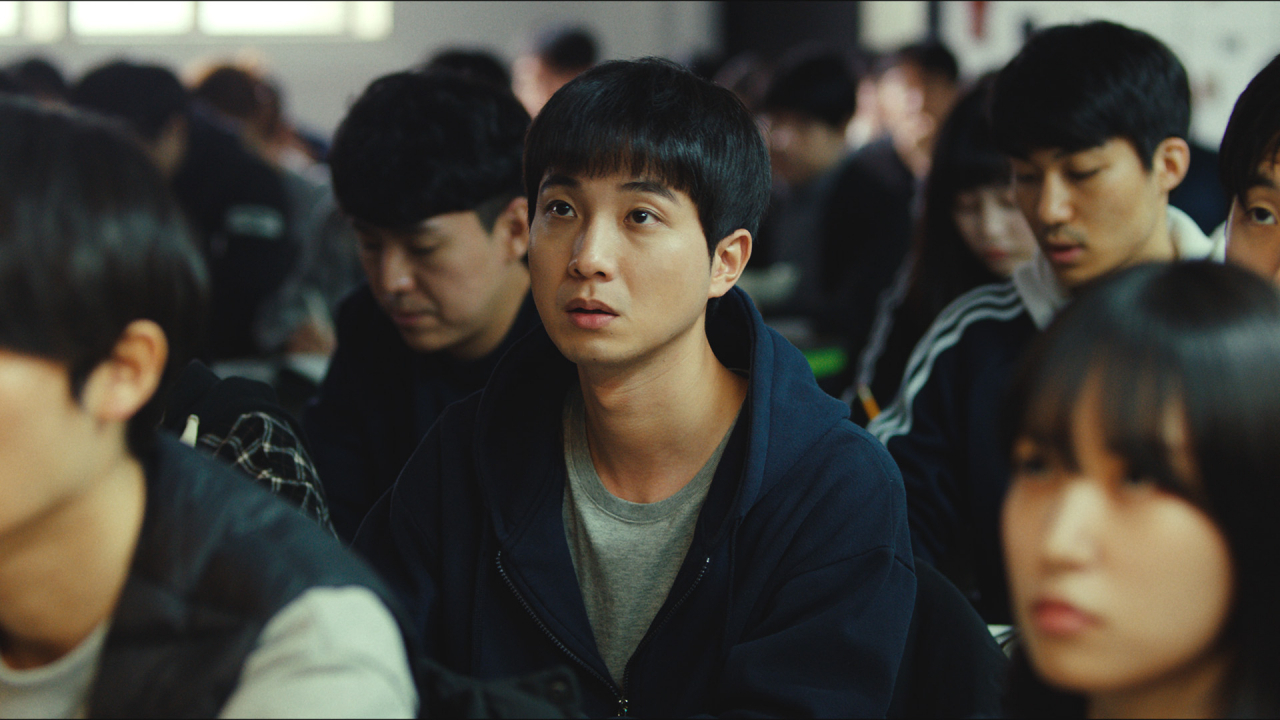London Korean Film Festival has returned for its 17th edition. From new releases to hits from renowned Korean directors, the FilmSoc Journal reviews a selection of films showing at this season’s festival.
Khushi Jain reviewsOh Seong-ho’s directorial debut: a sensitive and merciless story of two people navigating life as one.
Kyung-hak and Hye-jin ride together on a motorbike; the busy road behind them is blurred out but the uncertainty and anxiety on their faces is clear as day. The tagline reads, “I think I’ve always been in a hurry to reach you.” Time, movement, desire and reality merge into each other in Through My Midwinter, Oh Seong-ho’s utterly sensitive directorial debut. The official poster for the film subtly introduces each of these ideas – or rather conflicts – that young people in South Korea, and the world at large, are forced to engage with.

Through My Midwinter begins as a story of two people trying to get through life as one. Kyung-hak (Kwon Da-ham) is preparing for the police entrance exams, and his girlfriend Hye-jin (Kwon So-hyun) is anticipating a prestigious job at the government tourism board. The two are wonderfully in love, sharing dreams and supporting each other. The sudden news of an unpaid debt flashes like a whip on this tender relationship. Kyung-hak, having been the co-signatory on his mother’s loan, is now forced to pay it off. He becomes a food delivery man and gradually stops studying. When ambitions clash with financial realities, the strong but delicate bond between Kyung-hak and Hye-jin starts to crack. As the film unfolds, Kyung-hak finds himself at the centre of a series of thematic feuds, trying to survive through them all.
Relationships are the bedrock of humanity. At the same time, they are the most sensitive aspects of being human, aspects with the potential to crumble. But how do you end a relationship? Love may have run out but familiarity remains, because people become more than just people. Through My Midwinter talks about the persistence of this familiarity, about a lingering present absence. Reality doesn’t mix well with love, leaving Kyung-hak alone, and Oh Seong-ho to explore his protagonist’s loneliness through elongated silences. The film has a very firm grasp on its study of modern romantic relationships. The two major confrontational scenes between Kyung-hak and Hye-jin are dripping with naturalism. They are intense and real.. Oh Seong-ho is especially interested in the frailty of his characters and their love. Hye-jin’s mother is the pragmatic voice, regularly reminding her daughter (and us) that love is a fantasy but living is rooted in the real world, the world of materiality, of money. In Love vs Reality, Reality usually wins.

Kyung-hak’s reality comes crashing down on him. His work as a delivery man is founded upon an urgency to earn money. The film not only exposes the tangible problems that he faces, but also gives ample space to the slow and gradual draining of his patience, joy and optimism – again conveyed through long silences. A sudden tragedy strikes one of the other delivery men and the house bereft of Hye-jin becomes bitterly desolate, leading Kyung-hak to leave his job and his home. He becomes a factory worker.
The thin line between stability and monotony is where the film looks for its definition of ‘work.’ Oh Seong-ho’s commentary on contemporary work culture is dynamic. The film tries again and again and again to find meaning in work, but is always confronted with a harsh situation that prevents it from doing so. Throughout the film, work for Kyung-hak is shackled to money. He works only to earn. But there comes a point of exhaustion, a blend of isolation, meaninglessness and hurt, but most importantly, the realisation of an invisible desperation. Upon acknowledging this, Kyung-hak breaks down. Masterfully composed and brilliantly acted, in a long sustained shot of Kyung-hak lying on the floor, crying his heart out, Through My Midwinter collapses into itself. Oh Seong-ho portrays pain with immense gentleness.
At the end of day, Through My Midwinter is not a romance but a bildungsroman, a very carefully and affectionately written bildungsroman. Kyung-hak has some difficult lessons to learn. A strong scrutiny of the problems faced by young people today, the film is not preoccupied with changing the system but learning to survive it. It is merciless in this sense, and perhaps even bleak, though it remains very real. It notes that choices are not right or wrong, but necessary, and the foundations of these choices are always worth deconstructing. The colour red is an interesting symbol, signifying luck and prosperity, and their fickleness, at the same time. The dexterous employment of the motif of movement is one of the film’s primary strengths. In a very intriguing and creative cinematic application of the motif, movement is attached to, and used to define and dissect, time, reality, work and relationships. The frequent shots of characters in moving vehicles equal the many moments when all motion is suspended. Movement marks in-betweenness, it is the site of struggles and efforts to try and get somewhere. Movement away from a person, a desire, a dream, a house, an idea of the future, is never easy but at times extremely necessary. And the most important movement is towards tomorrow.
![Photos] New Stills Added for the Upcoming Korean Movie 'Through My Midwinter' @ HanCinema](https://photos.hancinema.net/photos/fullsizephoto1579524.jpg)
Perseverance is what Through My Midwinter has to offer. In its somewhat arid landscape, it leaves space for perseverance to bloom. The title itself is a nod to this. Kyung-hak will get through his midwinter. Perseverance doesn’t only help him survive the tragedies but makes him aspire for a better life. And he understands that it is hard but crucial to give things time. Kyung-hak is always in a rush; he drives too fast and faces an accident, and almost injures himself badly at the factory because of his hastiness. “I think I’ve always been in a hurry to reach you,” the film’s poster reads. ‘You’ here is Hye-jin, becoming a police officer, the delivery man job, working at the factory, stability, financial safety, happiness and contentment. ‘You’ is also Kyung-hak himself. Towards the end, when buying notebooks, he considers a blue and a red one, and chooses the red.
Through My Midwinter is a masterpiece of the ordinary. There is something to take away in every scene and dialogue. The film discusses some difficult topics with its skilled application of Maslow’s Hierarchy of Needs. It draws a dark picture of the powerlessness of the common person and yet manages to find pin pricks of light within the same darkness. Its camera-work is honest and tender. Oh Seong-ho is selective with his stretches, using them to intensify emotion both within and without the screen. Kwon Da-ham as Kyung-hak is a subtle genius and deservedly won the Actor of the Year at the 26th Busan International Film Festival. In the end, this film is a sadly beautiful and beautifully sad story about tackling reality.
Watch the trailer forThrough My Midwinter here:




